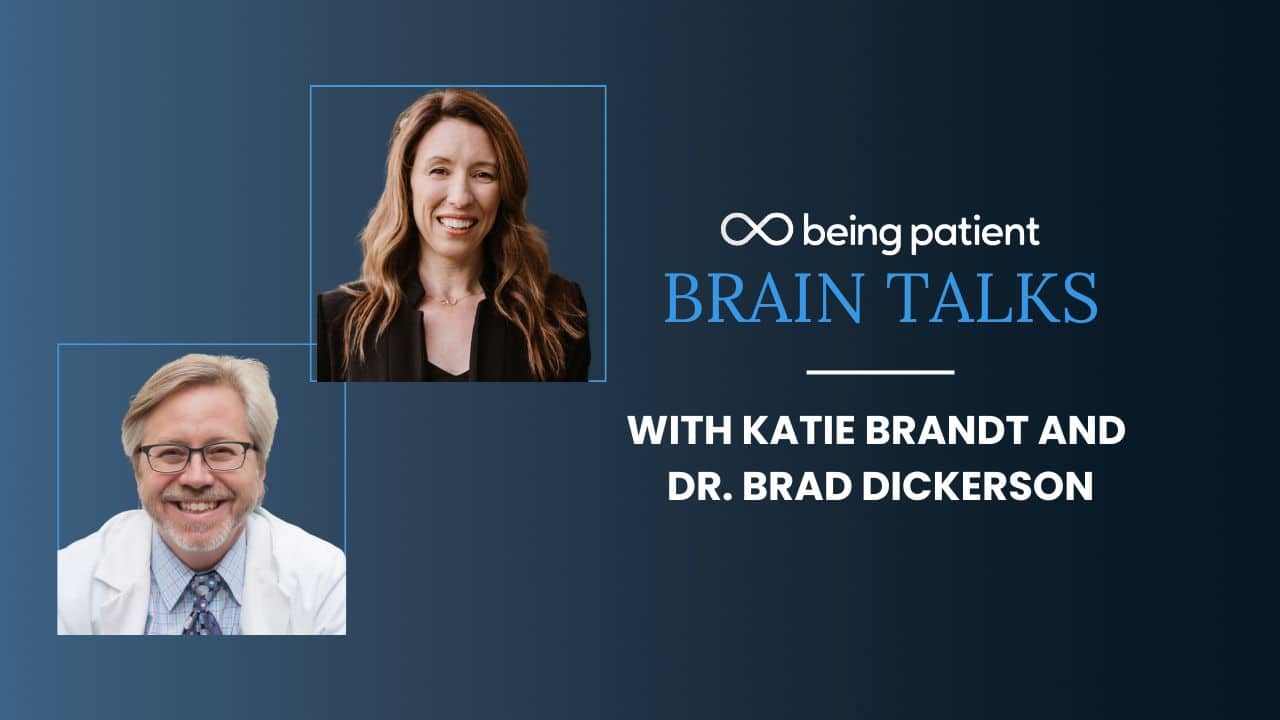
- This event has passed.
Katie Brandt and Dr. Brad Dickerson: Understanding Frontotemporal Dementia
March 10, 2023 – 11:30 am – 12:00 pm PST

This event has passed. You can read highlights from the interview and watch the YouTube recording of the talk here.
On Friday, March 10th, 11:30 a.m. PT/2:30 p.m. ET, Katie Brandt and Dr. Brad Dickerson join Being Patient Live Talks to discuss frontotemporal dementia and what goes into diagnosis. With the news of Bruce Willis’s diagnosis of frontotemporal dementia, many have questions about diagnosis and what to expect.
Brandt, who has spoken with Being Patient previously on the impact of her late husband’s frontotemporal dementia diagnosis, is an advocate for awareness from the caregiver’s perspective. She’s also the director of caregiver support services and public relations for Massachusetts General Hospital’s Frontotemporal Disorders Unit, a lead volunteer with the Association for Frontotemporal Degeneration (AFTD), and a co-facilitator of the Boston area FTD Support Group.
Dickerson, an advisor for Being Patient, is the Director of the Massachusetts General Hospital Frontotemporal Disorders Unit and Neuroimaging Lab in Boston. He is also a staff behavioral neurologist in the MGH Memory Disorders Unit and co-investigator on the Neuroimaging Core of the Alzheimer’s Disease Research Center. Both will share their insights and answer reader questions about frontotemporal dementia.
Brandt and Dickerson join Being Patient founder Deborah Kan to answer key questions from a caregiver and medical perspective. Tune in via Being Patient’s Facebook page to learn more about frontotemporal dementia from a caregiver and brain health perspective.
Who's coming?
184 people are attending Katie Brandt and Dr. Brad Dickerson: Understanding Frontotemporal Dementia
My husband has been diagnosed with LBD That was 5 years ago going on 6 and I was still confused about everything that’s happening to him. It’s Frustrating to say the least. I’m looking forward to Your seminar , any information about dementia Will help.
Would you be willing to talk about the motor types of FTD including Corticobasal Syndrome. In most of the news stories, CBS and PSP never get mentioned. I would love people to learn about those types of FTD as well. Thank you!
Hi ! I’m Dawn Kirby, I did an interview with Deborah / Dr. Dickerson a couple of years ago about my daughter, Kara. She was diagnosed with bvFTD ,29, at Mayo Clinic by Dr. Boeve.
Sadly, Kara passed away on New Year’s Day ‘23 at age 33. We miss her terribly but grateful she isn’t suffering anymore.
She was in the ALLFTD study and we donated her brain to Mayo Clinic Research Center, to further her support for a cure.
I plan to watch the Dr. Dickerson/Katie interview. I signed up as an AFTD volunteer and plan to be an active advocate for this cause. This helps me bring purpose to our pain. Caring for Kara 24/7 for 4 years was challenging. Though nonverbal, we learned Love needs no words. Kara was very comforted by holding hands , a simple kiss on the cheek and being included. We learned that human touch is very powerful.
Thank you for all your organization is doing to educate and bring awareness to Dementia. Dawn
Hi Dawn, I am so sorry to hear about Kara. Sending thoughts and condolences. Please do join and we would love to have you there. Inspired by your advocacy. Deborah
Hi will this talk be available to listen back to after the event? I’m in Ireland and my mum has just been diagnosed with FTD so I’m very interested to hear what’s being said but I have to work at the time this talk is on.
Yes! We publish all of these talks afterwards on https://www.beingpatient.com. Please let us know if you have any questions you would like us to ask Dr Dickerson or Katie Brandt!
I’m in the EST time zone. Only PST is indicated for participation in the Being Patient Facebook Page. How can i participate?
Hi Maxine,
Both times are indicated in the invite. It will take place Friday, March 10th, @ 2:30 p.m. ET. We hope you can join us!
My husband has been dx with PPA. He is in the moderate stage. The doctors don’t tell me what to expect or how he may progress, how fast, etc. They just say his speech will get worse. Contact a speech pathologist and “See you in 6 months”. No treatment. I seem to go day to day blindly dealing with each little issue that comes along.